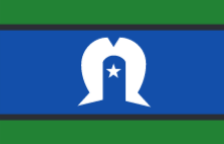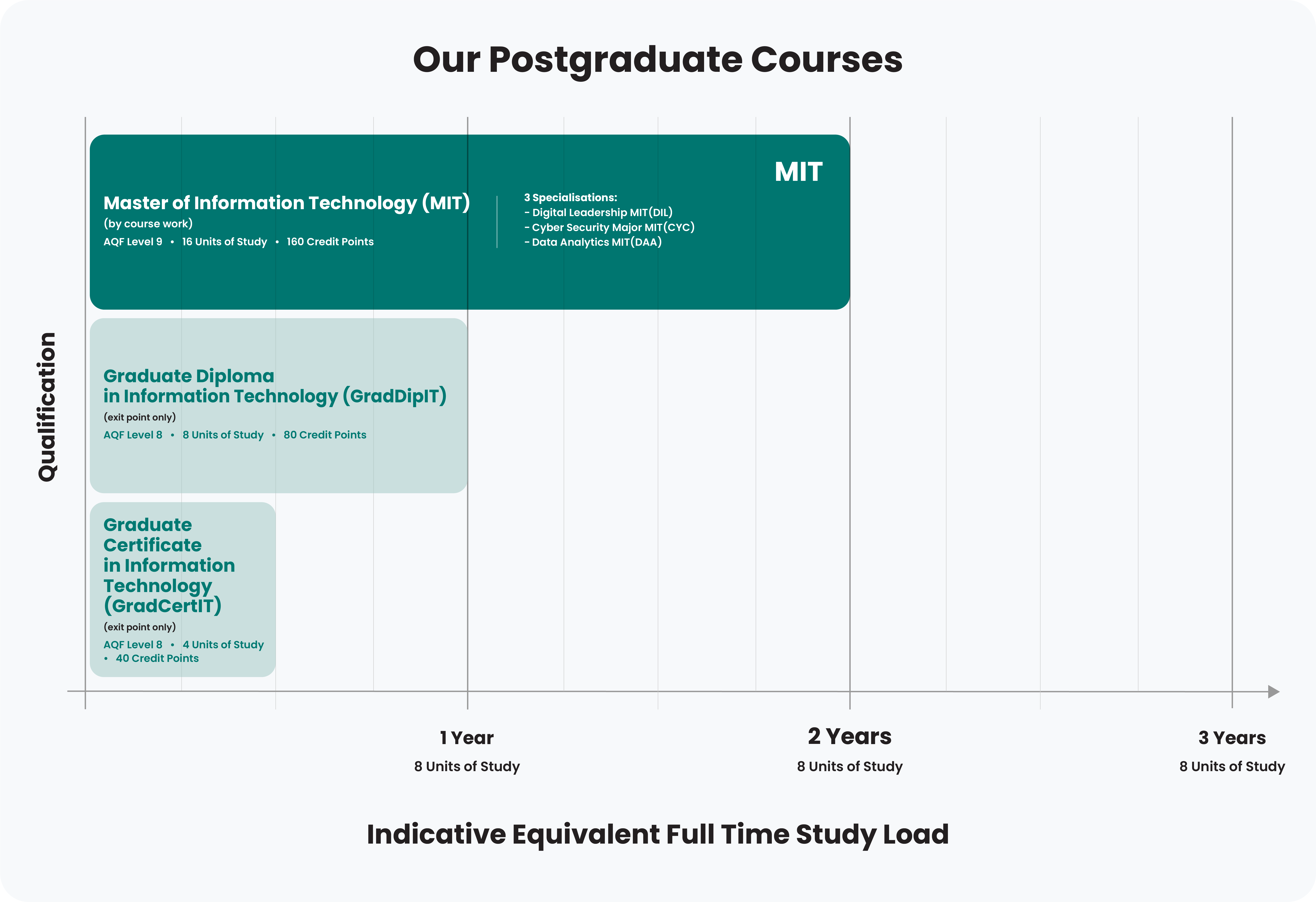
Our Graduate Diploma in IT is also designed to prepare students for employment or career progression through a combination of technical and leadership skills.
It enables students to further their studies by enrolling in a postgraduate IT course. It also fulfils career needs of those interested in a career progression in IT by preparing them with fundamental and advanced knowledge and skills.
The Graduate Diploma is comprised of the first eight units of the Master program. This allows students to transition directly into the Master qualification with 8 units of credit towards the 16 units required.
Our graduate attributes represent the graduate qualities and skills our students may develop throughout their course of study.
- Demonstrate comprehensive knowledge and skills in their chosen discipline and apply them in relevant professional contexts.
- Demonstrate the capacity to be innovative, entrepreneurial, and take on leadership roles in their chosen career.
- Communicate effectively to culturally diverse professional audiences across multiple platforms to achieve common goals.
- Solve problems independently and as part of a team by applying research methodologies, critical, creative, and evidence-based thinking to provide innovative responses to existing and future challenges and to solve real-world problems.
- Act with professional integrity and promote ethical practice in work and business.
- Display resilience, reflexivity, and self-awareness and respond appropriately in a range of professional contexts including new environments and issues.
- Demonstrate appropriate knowledge and understanding of ICT infrastructure technologies and explain the relationships and interdependencies between these. (ACSGA2)
- Skill and ability to identify the need for transformative digital solutions, especially those relating to provision of ICT systems and infrastructure, elicit requirements from relevant stakeholders and research and plan solutions to meet these requirements. (GA1, GA5, ACSGA1, ACSGA3)
- Demonstrate problem-solving skillsto apply contemporary technologiesto previously unseen problems in innovative ways when implementing, maintaining, documenting, and troubleshooting systems. (GA3, GA5, ACSGA1, ACSGA3, ACSGA4)
- Assess and analyse the appropriateness of competing methodologies and technologies for the analysis, design, and implementation of ICT solutions, including consideration of alternative approaches to enterprise architecture and ICT procurement. (ACSGA1, ACSGA3, ACSGA4)
- Plan and deploy secure network systems utilising current practices in IP technologies, network security, and scalable server deployment, considering issues of virtualisation and cloud deployment. (ACSGA2)
- Communicate effectively in English in a professional context, adapt interaction style to a given audience, work efficiently in a team, and identify and address pertinent legal, social, and ethical issues in particular ICT contexts. (GA2, GA4, ACSGA3)
- Offer computer support servicesto individuals and small to medium sized enterprises, as well as becoming employed as a computer services professional in an organisation. (GA1, ACSGA1)
Graduate Diploma in IT
General admission
- have attained 18 years of age on commencement of studies
- Australian bachelor’s degree qualifications in a cognate discipline or;
- International Bachelor qualifications or equivalent in a Cognate discipline listed at https://www.uac.edu.au/future-applicants/postgraduate-applicants; or
- Relevant Work Experience in a relevant cognate field for a minimum of two years and completed within the last 3 years. Applicants need to demonstrate work experience is relevant to the course, current, and equivalent to the learning outcomes achieved in a bachelor’s degree in the same discipline as the proposed Post Graduate Program. Students provide this evidence in the form of a written reference from their current workplace outlining their current duties and how they are relevant to the master’s program.
- Applicants applying with bachelor’s degrees, or work experience in a non-cognate field need to provide an additional personal written statement outlining how their formal studies and work experience having provided them with sufficient learning as to be able to reach the entry standards. Such students may be subject to a written examination or interview with the Academic Dean. Students may need to complete appropriate introductory units as determined by the Academic Dean.
- Any credit applications are considered under the SISTC Credit Transfer and Advanced Standing Policy.
International Students English Langauge Requirements
Applicants require one of the following, completed within the last 2 years:
- IELTS Academic: 6.5 with no band less than 6.0; or
- TOEFL: 575 or better; or
- TOEFL IBT (International Benchmark Test): 91 or better; or
- TOEFL CBT (Computer Based Test): 235 or better; or
- Academic PTE (Pearson Test of English): 58 or better; or
- Cambridge English: CAE and CPE (from 2015): 176 or better; or
- General Certificate of Education (GCE): A Levels with a C or better in English; or
- KITE: all bands B2 with a result greater than 450 in each band; or
- Duolingo: overall 115 with no band less than 110; or
- completed 12 months of study in Australia.
Our fees and charges are set periodically by our Board of Directors.
How to PayIt is easy to pay your fees to Sydney International School of Technology and Commerce. You'll find various fee payment options when you receive your application to study with us.
Fees and Charges ScheduleView our Fees and Charges Schedule
On completion of the Bachelor of Information Technology, some potential jobs you might consider.
Potential jobs:
- Cybersecurity Engineer:
Designs, implements, and maintains security solutions against cyber threats. - Penetration Tester (Ethical Hacker):
Identifies system vulnerabilities for security enhancement. - Digital Forensic Analyst:
Investigates and analyses digital evidence for cybercrime investigations. - Data Scientist:
Extracts insights from large datasets for decision-making. - Business Intelligence Analyst:
Provides actionable insights for business optimisation. - Data Engineer:
Designs and maintains data infrastructure for analytics. - Digital Transformation Manager:
Drives organisational change through digital integration. - IT Project Director:
Oversees large-scale IT projects for organisational success. - Enterprise Systems Manager:
Manages implementation and optimisation of enterprise-level IT systems. - Cloud Solutions Architect:
Designs and implements cloud-based solutions to meet business requirements. - Web Developer:
Focused on developing web applications for client-server communication.

Melbourne or Sydney Australia


